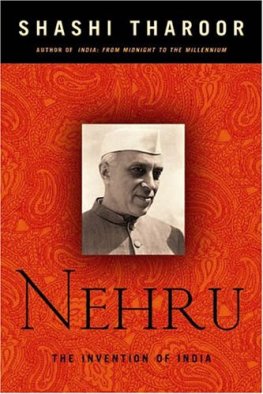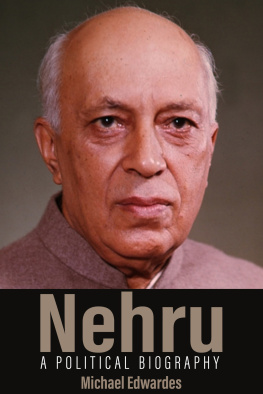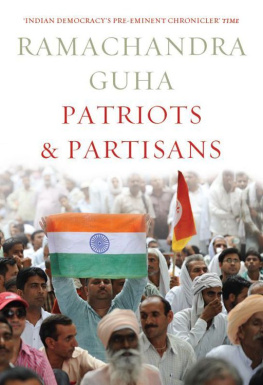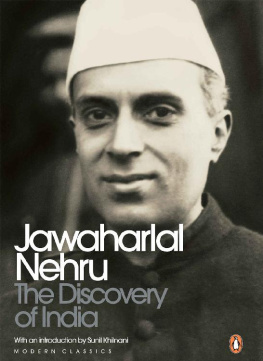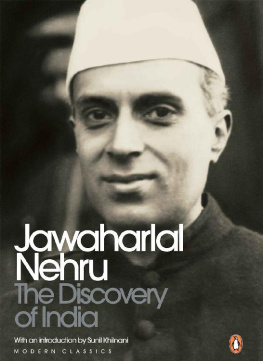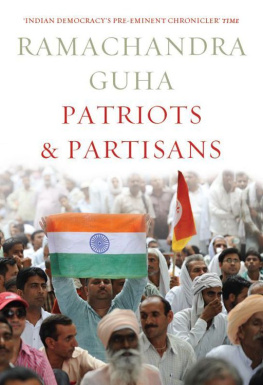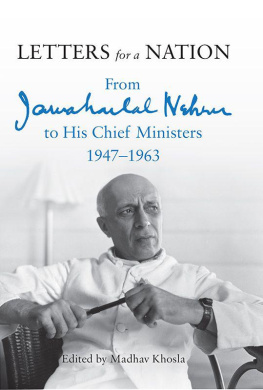Nehru
A Contemporarys Estimate
Walter Crocker
With a foreword by
Ramachandra Guha

RANDOM HOUSE INDIA
Published by Random House India in 2009
Copyright Estate of Walter Crocker
Foreword Ramachandra Guha 2008
Random House Publishers India Private Limited
Windsor IT Park, 7th Floor, Tower-B,
A-1, Sector-125, Noida-201301, U.P.
Random House Group Limited
20 Vauxhall Bridge Road
London SW1V 2SA
United Kingdom
This eBook is copyright material and must not be copied, reproduced, transferred, distributed, leased, licensed or publicly performed or used in any way except as specifically permitted in writing by the publishers, as allowed under the terms and conditions under which it was purchased or as strictly permitted by applicable copyright law. Any unauthorised distribution or use of this text may be a direct infringement of the authors and publishers rights and those responsible may be liable in law accordingly.
EPUB ISBN 9788184002133
To the memory of my father and mother,
pioneers and the children and grandchildren of
pioneers of South Australia
Contents
Foreword
Ramachandra Guha
I
The relationship between Australia and India has usually been viewed through the lens of cricket. Don Bradman and Keith Miller were heroes to a generation of Indians predisposed to admire all those who got the betterwherever and in whichever wayof the British. More recently, Australians have warmed to the batsmanship Down Under of those two little masters, Gundappa Viswanath and Sachin Tendulkar.
An Indian who saw Australia as an essentially sporting nation was Jawaharlal Nehru. Between 1947 and 1964 Nehru served as prime minister of India and concurrently, as foreign minister. Among the high commissioners he sent to Canberra, two were polo-playing generals, K.M. Cariappa and S.M. Shrinagesh. A third was a cricketer, Kumar Shri Duleepsinhji. All were good men; none, however, were unduly endowed with acumen, political or otherwise.
Where the cricketing relations between the two countries are intense and increasingly rivalrous, the political relations between them have been insubstantial. Still, there are at least two Australians whose connections to India deserve to be better known. One is Richard G Casey, the firstand lastAustralian to hold high office under the British Raj. Casey served as governor of the Bengal Presidency between 1944 and 1946, a time of famine and civil war, and acquitted himself honourably. Although a loyal servant of the Raj, he was broad-minded enough to befriend Mahatma Gandhi. When, in the 1950s, Casey became Australias foreign minister, he sent as high commissioner to Delhi a man of uncommon intelligence named Walter Crocker. Crocker spent nearly eight years in the job, these spaced out in two separate terms.
Richard Caseys name has not entirely disappeared from the historical record. However, that of Walter Crocker has. This is a pity, for he was a civil servant and diplomat who found time to write several very good books. The best of these was on Indias longest-serving and most controversial prime minister. Nehru: A Contemporarys Estimate was first published in 1966 but was, until now, long and lamentably out of print.
II
Walter Crocker was raised in rural South Australia, the descendant of English farmers who had come out in the 1840s. At the age of fourteen he was sent to boarding school, following which he joined the University of Adelaide. His first trip out of South Australia was to Oxford, where he took a second degree at Balliol College.
On graduating from Oxford, Crocker worked for the League of Nations and as a colonial administrator in Nigeria before joining the diplomatic service. He served in a dozen countriesa chapter of his book Australian Ambassador is entitled Three Thousand Cocktail Parties for My Country and Other Aspects of the Diplomats Life. In between assignments, he was the first ever Professor of International Relations at the Australian National University.
Crocker first lived in India as an army officer during the World War II. He returned in the 1950s, as High Commissioner in New Delhi. India, he would write, throws up some remarkable menGandhi, Rajagopalachari, Jaya Prakash Narain, Nehru and many others make a resplendent roll call. On the other hand, as he recalled, I was cheated repeatedly, contributed to more bogus charities and was taken in by more bogus medical certificates, and was importuned, not seldom by highly-placed persons, to get positions in British universities and hospitals or to misuse my diplomatic immunities so as to bring in illegally scents and other luxuries through the Indian customs, up to carrying on a campaign to get the Nobel Prize, more often than I can remember.
Most of Crockers time in New Delhi was spent studying Jawaharlal Nehru. The Indian prime minister, he later remarked, was so fascinating as by himself to make my India assignment fascinating. Nehru, in turn, had a high opinion of the Australian diplomat; as he wrote in a letter to a cabinet colleague: Crocker is a good man with clever ideas, unlike the Government he serves.
When Nehru died, on May 27, Crocker was Australias ambassador to the Netherlands. As he noted in his diary that night, not much else [was] in my mind for the rest of the day. My Indian friends and associations, who meant so much for me for the last 12 years, are struck down, one by one. Last week it was [the diplomat] Harish[war] Dayal. Not long before that it was [the civil servant and planner] Sir V.T. [Krishnamachari], and then [the historian K.M.] Panikkar. And a couple of months or so ago it was [the Gandhian] Amrit [Kaur]. Now the beacon light itself has gone out.
A few months later, Crocker began his book about the Indian prime minister and the long years of his tenure. He drew upon years of keen observation, of watching Nehru at work in his office, in parliament, and on the road. Crocker had also talked to Nehrus colleagues and to his political rivals, and of course to many ordinary Indians.
In the autumn of 1965 Crocker sent a draft of his book to Penderel Moon, a distinguished scholar and former Indian Civil Service official who had himself written several books on modern India. A copy was also posted to Stanley Unwin in London, who had published Crockers previous works. Moon praised the author for having drawn such a vivid picture of the man and, I would say, a fair and correct one. However, he asked for some changes in the sections dealing with China.
Unwin was also pleased with the draft, which he described as so balanced, so obviously fair. As a portrait of Nehru, he commented, and as a picture of the times and of the conditions under which he was brought up and later carried such great responsibilities, it is unlikely to be bettered. The manuscript was then vetted by the Australian foreign ministry, since Crocker was a serving diplomat. Some critical comments on Indian policy with regard to China and Kashmir had to be excised, causing the author to privately grumble that, a rather anemic book is the result
III
Nehru: A Contemporarys Estimate was published by George Allen and Unwin in January 1966. At the time, Crocker was living in East Africa, as ambassador to Kenya, Uganda, and Ethiopia. He was nervous about the books reception, particularly among Nehrus countrymen. While sending a review copy to the East African Standard, he hoped that the editor would not give it to an Indian to review, or if you do, that you give it to a very objective one as I, like any other historian of Nehrus life, have had to make some unfavourable observations on certain Indian policies.
Within India, of course, Crocker could not prevent Indians from reviewing his book. Some early notices suggest that it was being read less than objectively. A reviewer in the
Next page

